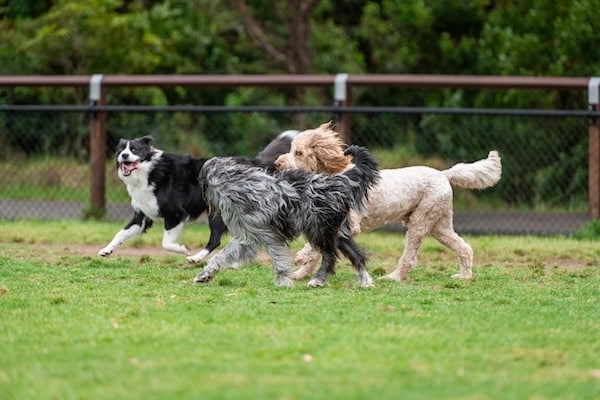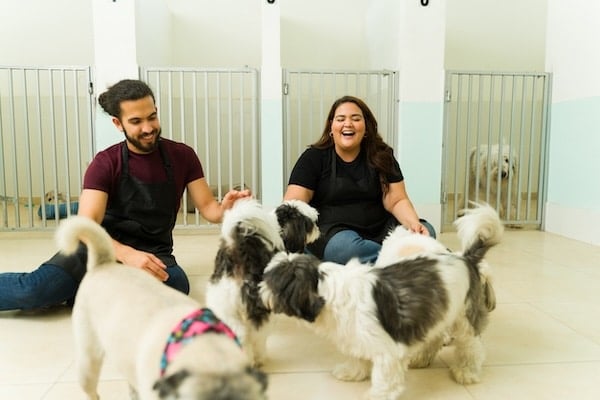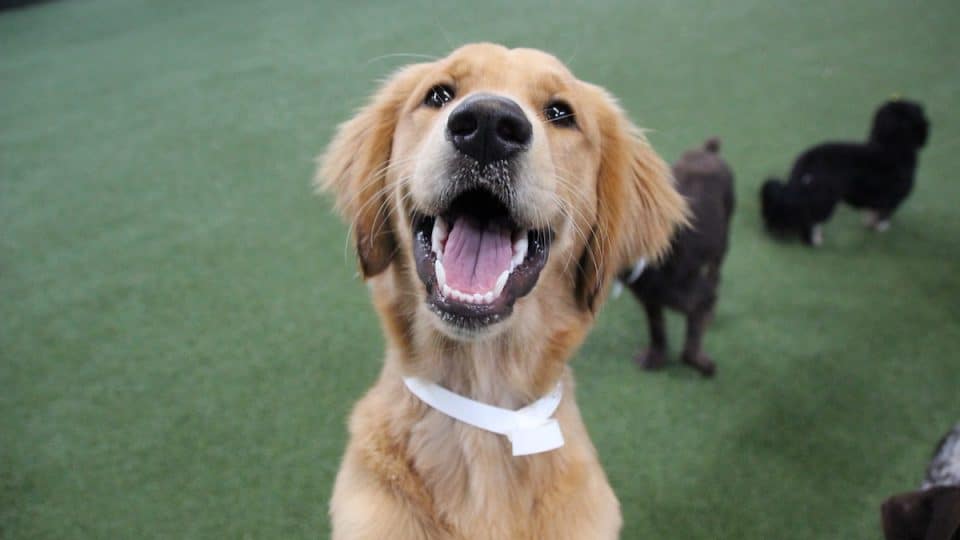Over the last decade, doggy day care has evolved from a niche service into a vital resource for busy pet guardians. Today, you’ll find a range of options, from large chain facilities to small home-based setups.
In the simplest terms, doggy day cares watch dogs while their humans are at work or away. But a quality doggy day care is more than just a babysitter—it’s an opportunity for enrichment through exercise, play, and structured socialisation. It can help prevent boredom-related behavioural issues and support puppy socialisation.
In the UK, the Animal Welfare Regulations of 2018 establish mandatory conditions for obtaining a dog day care licence, while other aspects are more flexible. Different tiers of licence apply, with some able to pursue a “higher standards” licence if they meet 100% of mandatory higher standards and 50% of optional higher standards.
Optional higher standards include a fixed or portable air temperature control system and one full-time staff member per eight dogs, for example. However, even a doggy day with a higher standards licence may only need to meet half of these criteria. This means you’ll see a lot of variation in protocols, amenities, and overall quality.
To help you find the best option for your pet, we consulted two professional trainers. Here’s everything you need to know about doggy day care, from services provided to which dogs are most likely to benefit.
What Is Dog Day care Like?
What can you and your pooch expect from doggy day care? Here are the structures, schedules, and services you’re likely to encounter.
Setup, supplies & amenities
Doggy day cares differ widely in their setup. Some facilities are indoor-only, providing a climate-controlled environment for dogs. Others also feature an outdoor space where pups can run and explore. Indoor-only spaces should have a designated space for dogs to poo and pee, like a dog run, garden, or toileting area with artificial turf, with waste stored away from the food.
Typically, day care facilities have multiple indoor play areas to separate dogs by size, energy levels, and temperaments. This arrangement prevents small or timid dogs from being bowled over by bigger, more energetic pups and minimises the risk of injuries. However, while this isn’t a requirement, day cares must have the ability to separate dogs and consider age, size, and behaviour when allowing dog mingling.
The Animal Welfare Regulations of 2018 don’t specify a hard maximum ratio of dogs per staff member of a licensed day care. However, their guidelines recommend that businesses “must have enough staff to meet all dogs’ individual welfare needs fully.”
They stipulate that there should ideally be ten or fewer dogs per staff member. A lower ratio is even better, since it allows for more individualised attention.
To keep dogs happily engaged, many day cares supply toys and amenities like:
- Puzzle toys for mental stimulation and problem-solving skills
- Agility equipment, like tunnels, ramps, and weave poles
- Scent games for nosework fun
- Interactive toys like tennis balls, frisbees, tug-ropes, and teaser toys
- Water play during warm months, which might include wading pools, sprinklers, and hoses
Note: As a precaution, many day cares request that you leave your dog’s favourite toys at home to minimise potential squabbles.
Schedule & activities
Doggy day cares may offer a variety of activities, including play sessions, group walks, training exercises, meals, rest periods, and enrichment activities. They might even participate in unique activities, such as bubble blowing and puppy painting.
A typical doggy day care schedule could look something like this:
- 6:30-8 a.m. Morning drop-off
- 8-11 a.m. Morning playtime with organised activities and group interaction
- 11 a.m.-12 p.m. Rest period (sometimes in a crate, if the facility uses them—not all day cares do)
- 12-1 p.m. Lunch, if applicable (some day cares provide lunch, others ask that you pack one)
- 1:30-4 p.m. Afternoon activity, including play, training sessions, and lower-energy activities
- 4-7 p.m. Evening pickup
Services & add-ons
On average, pet parents can expect to pay around £20-45 per day for doggy day care, according to Blue Cross. Costs can vary depending on your location and your dog’s specific needs.
Along with supervised playtime, some doggy day cares offer additional services for an extra fee. You might encounter add-ons like:
- Grooming services. Some facilities offer nail trimming, ear cleaning, and even specialised spa-like treatments like aromatherapy or doggy facials.
- Medical care. Many day cares will administer topical and oral medications. They may also handle bandage changes, insulin injections, or even hand-feeding for an additional fee.
- Training programs. Your pup may have the chance to brush up on basic cues or lead-walking skills. Some day cares also address behavioural issues, and most keep pet parents in the loop with daily progress reports.
- Overnight boarding. Certain doggy day cares offer overnight stays for an extra fee. Some even cater to reactive and anxious dogs.
- A la carte services. For a personalised experience, you may be able to add extras like private walks, one-on-one playtime, special training sessions, or stuffed KONG toys.

kontrymphoto via iStock
Pros and Cons of Doggy Day Care
Some dogs will thrive in day care—others not so much. Your dog’s experience depends on a number of factors, including their personality, the staff’s training, and how much time your pup spends at day care.
Younger, more energetic dogs benefit
Young, energetic dogs who love to play tend to thrive in a day care setting. Older dogs with low stamina, on the other hand, sometimes find the bustling activity too overwhelming.
But that doesn’t mean senior dogs can’t go to day care, too. As Allie Bender, a certified dog behaviour consultant (CDBC), trainer (CPDT-KA), and founder of Pet Harmony points out, many day cares have separate low-energy groups to accommodate dogs who move a little slower. A good day care will carefully monitor canine body language to recognise when a dog needs a break.
Well-socialised dogs thrive
Outgoing dogs who love to mingle with humans and other dogs often find day care a dream come true. However, shy or anxious dogs may struggle in such a stimulating setting, says Erin Askeland, certified dog trainer and behaviour consultant (CPDT-KA, CBCC-KA) at Camp Bow Wow.
Before considering day care, assess your dog’s social skills. Dogs who get along with the majority of other dogs and can handle conflict well are usually good candidates, Bender says.
Day care can also be good for puppy socialisation, though it can’t cover everything a puppy needs to learn.
Behavioural issues need extra care
Certain behavioural issues could be problematic in a day care setting. Askeland notes that dogs who resource guard can be risky in a group environment, especially if there are loose toys around.
Additionally, pups who are pushy or competitive, tend to bark excessively, or ignore social cues from other dogs, can be challenging for day cares to manage.
Dogs with health issues may not be a good fit
Dogs must be up-to-date on vaccinations and be free from any contagious illnesses, says Askeland.
She points out that dogs with mobility issues, such as arthritis, might also struggle in a bustling day care environment. For these dogs, you can inquire about enrichment-focused or low-energy groups.
Note: Some facilities may require your dog to be crate-trained, but it isn’t necessarily a universal requirement. Just make sure you understand your day care’s specific policy regarding crate use.
What Makes a Good Day Care?
It can be scary to trust strangers with your precious pup, but knowing you’ve found a quality facility helps. Here’s what to prioritise.
Licensing
A reputable day care will have all the proper licensing for its location and services. To stay compliant, they’ll have to pass regular inspections regarding aspects such as cleanliness, ventilation, staff qualification, and emergency protocols.
Insurance
Similarly, doggy day cares should have and be transparent about their insurance policies. Ideally, they’ll have comprehensive coverage that protects the staff, facility, and dogs in their care.
Vaccination policies
A good day care will have strict rules and enforce staying up-to-date with vaccinations such as rabies, parvovirus, distemper, and kennel cough (bordetella). These policies minimise the spread of common and contagious canine diseases.
References and reviews
Positive online reviews and personal references can provide valuable insights into a day care. Look for recurring comments and themes related to professionalism, cleanliness, communication, and whether dogs appear to be happy there. You can even ask the day care for direct references from their current clients.
Dog attentiveness and professionalism
Day care staff aren’t likely to have the same credentials as professional dog trainers and behaviourists. However, they should still be qualified and have the proper knowledge to ensure your dog has a good experience in their care.
Look for attentive staff who actively engage with the dogs and quickly step in to resolve any signs of stress or conflict. Rotating playgroups, providing plenty of breaks, and giving one-on-one attention are all signs of a committed doggy day care.

Antonio_Diaz via iStock
Vetting Your Doggy Day Care Facility
Once you’ve found a promising doggy day care, it’s essential to ask the right questions. A reputable provider will welcome your questions and respond honestly. Here’s what to ask, plus the answers you should be looking for.
1. What do you look for during the trial day?
Day cares should have a clear protocol for accepting new dogs. Askeland recommends asking how the day care assesses compatibility. Inquire about the behaviours that would prevent a dog from being accepted and which behaviours the staff finds most challenging to manage.
You can also ask what indicators the staff use to determine whether your dog is enjoying their time or feeling stressed out.
2. What is the staff-to-dog ratio?
Ideally, there should be one trained staff member for every eight to ten dogs. For high-energy groups, a smaller ratio is preferable.
With smaller groups, you’ll know that there are always active eyes on your dog, ensuring they have the best time in a well-supervised and safe environment.
3. Are there cameras? How will staff communicate with me?
Many day cares have live-streaming pet cameras so you can check on your pup throughout the day. Some facilities send photos and video updates via email, while others might send home a “school report” detailing your dog’s activities and behaviour.
4. How does the staff manage dog interactions?
Bender advises asking about the staff’s approach to conflict resolution and how they intervene if play becomes too rough. What do they do when they see warning signs, like growling or baring teeth? Staff should also be able to distinguish between play behaviours and signs of aggression or distress.
5. What does the staff do during an emergency?
It’s crucial to know how a day care handles emergencies, whether it’s aggressive behaviour, a natural disaster, or injuries. A good facility will have a comprehensive emergency plan, staff trained in canine first aid, and a communication protocol to keep you informed.
6. How are playgroups formed?
Quality day cares carefully match dogs based on factors like age, size, energy levels, and social skills. If you have a reactive dog or a shy pup who prefers the company of people, there are even doggy day cares that offer private spaces for one-on-one interaction with the staff.
7. What is the daily routine? Are there breaks and rest areas?
Askeland recommends seeing what a typical schedule looks like at the day care. Ask how breaks are built into the schedule and whether there are any quiet, private areas where dogs can rest and eat. All dogs, even social butterflies, need breaks to prevent overstimulation and injuries.
8. What training tools do the staff use during playgroups?
Bender encourages pet parents to ask what tools the staff uses to manage dogs. Ideally, they’ll be using positive reinforcement and fear-free methods.
Avoid facilities that use aversive training methods like spray bottles or shock collars, as they can create behavioural problems down the line.
Can My Dog Go to Day Care Every Day?
Doggy day care offers many benefits, but experts generally advise against sending your dog every day of the week.
“Every now and then, I find a dog who can handle this, but they’re a unicorn,” says Bender. Even if your dog enjoys day care and the staff is committed to minimising stress and providing rest periods, the environment is inherently stimulating. Daily attendance can lead to fatigue or stress, which may result in behavioural issues.
Alternatives to Dog Day Care
Doggy day care won’t be a good fit for every dog, but that doesn’t mean you’re out of options.
If you need daily care for your dog while you’re away, consider hiring a professional dog walker or pet sitter. Both options provide companionship and exercise without the stress of a day care setting.
Bender adds that some dog walkers and sitters even offer enrichment activities as part of their services. If you live near a trusted friend or family member, you could also ask them to check in on your pup.
For dogs who need extra stimulation or socialisation, try incorporating more enrichment activities at home. Your dog might like puzzle toys, snuffle mats, and scent games. Supervised playdates with familiar dogs can also offer a safe social outlet. If your dog would benefit from a more controlled environment, consider enrolling them in an online or small in-person training class.
Puppies, in particular, need socialisation but can be sensitive to overwhelming environments. Askeland notes that foundational classes provide a structured and safe setting for them to meet other pups and develop social skills. Pairing your puppy with friendly, well-matched dogs for playdates is another good idea.
Every dog is unique, so it’s important to find the right balance of care. Remember: All dogs are good dogs. Whether or not yours goes to day care doesn’t make them any less so!



